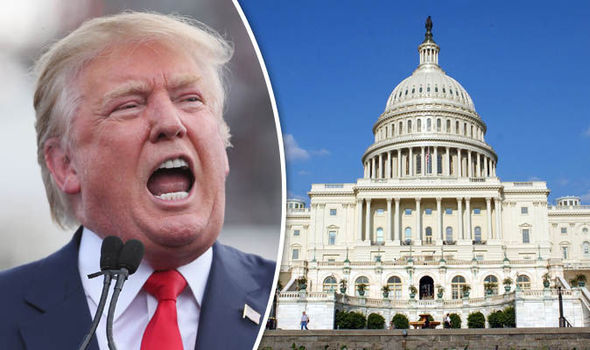The months-long battle over a proposed U.S.-Mexico border wall is set to escalate dramatically when President Trump declares a national emergency.
Talk of an emergency declaration immediately sparked division, and in some cases outright rebuke, from the GOP senators Trump will need on his side.
Senators on both sides of the aisle are steeling themselves for an entrenched, messy fight, with the declaration likely serving as an opening salvo in a high-profile political and legal battle.
Several Republicans panned talk of Trump moving forward with the plan, an option he has kept on the table as conservative allies fume that the deal to fund the government included only $1.375 billion for border barriers, instead of the $5.7 billion for a wall sought by the president.
“I believe it’s a mistake on the president’s part. I don’t believe that the National Emergencies Act contemplated a president repurposing billions of dollars outside of the normal appropriations process,” said Sen. Susan Collins (R-Maine), characterizing Trump’s decision was “of dubious constitutionality.”
Sen. Lisa Murkowski (R-Alaska) added that she didn’t “think that this is a matter that should be declared a national emergency.”
Sen. Rand Paul (R-Ky.), who has worked to cultivate a friendship with Trump, also characterized himself of “not in favor of operating government through emergency,” and insinuated that the move could violate the Constitution.
Trump has long floated that he might declare a national emergency to construct a U.S.-Mexico border wall if Congress wasn’t able to come up with a funding deal, despite pushback from top leaders on Capitol Hill.
Rep. Mark Meadows (R-N.C.), who is close with Trump, said yesterday that it “would be political suicide” for Trump to sign the funding bill without taking executive action to reroute funds toward the wall.
“I think there’s very little political liability from conservatives,” Meadows said about Trump coupling his signature of the bill with executive action.
In a boost for the president, Majority Leader Mitch McConnell (R-Ky.) announced on the Senate floor he would support Trump’s decision, a political U-turn from weeks ago when McConnell warned against an emergency declaration.
“I’m for whatever works, which means avoiding a shutdown and avoiding the president feeling he should declare a national emergency,” he said two weeks ago during a press conference with reporters.
Many congressional Republicans said they were taking a wait-and-see approach, and that their support or opposition would depend on the specifics of Trump’s declaration.
Sen. John Cornyn (R-Texas), who is close to McConnell, said he wanted to see what form Trump’s action took but noted that he previously raised concerns about executive action.
“My concerns about an emergency declaration were the precedent that’s going to be established,” Cornyn said. “I also thought it would not be a practical solution because there will be a lawsuit filed immediately.”
Cornyn noted that McConnell’s floor announcement came after hours of back-and-forth talks between the GOP leader’s office and the White House about whether the president would sign the funding bill and under what circumstances.
Sen. Ron Johnson (R-Wis.) also shrugged off McConnell’s decision to support the emergency declaration, saying, “That’s obviously one of the things the leader believes he has to do to get the president to support” the funding bill.
Sen. Marco Rubio (R-Fla.) said his stance will depended on the “structure” of the declaration but added that he generally doesn’t “think that’s a good approach, but we’ll have to deal with it.”
Democrats are likely to challenge Trump’s executive order in Congress, in addition to legal challenges in the courts.
Though rare, lawmakers believe they could pass a resolution of disapproval by a simple majority; it would be subject to a veto.
“He’s trying an end-run around Congress in a desperate attempt to put taxpayers on the hook for it. The Congress will defend our constitutional authorities,” House Speaker Nancy Pelosi (D-Calif.) and Senate Minority Leader Charles Schumer (D-N.Y.) said in a joint statement today.
To get a resolution blocking the action through the GOP-controlled Senate, Democrats would need to remain united and flip at least four Republicans.
They excoriated the move today, warning Republicans that supporting Trump now could haunt them down the line.
“A Democratic president can declare emergencies, as well,” Pelosi said Thursday. “So the precedent that the president is setting here is something that should be met with great unease and dismay by the Republicans.”
Sen. Chris Van Hollen (D-Md.), an appropriator, said a declaration would be “a gross abuse of power” and that it was “likely illegal.”
Sen. Jon Tester (D-Mont.), a moderate from a Trump-won state, said the decision was “not smart at all.”
“I think it sets a standard for declarations of emergency that just about anything could fit into, and he isn’t going to be the president forever,” Tester said. “I think it takes power away from the legislative branch, so it’s a failure on all sorts of fronts.”
